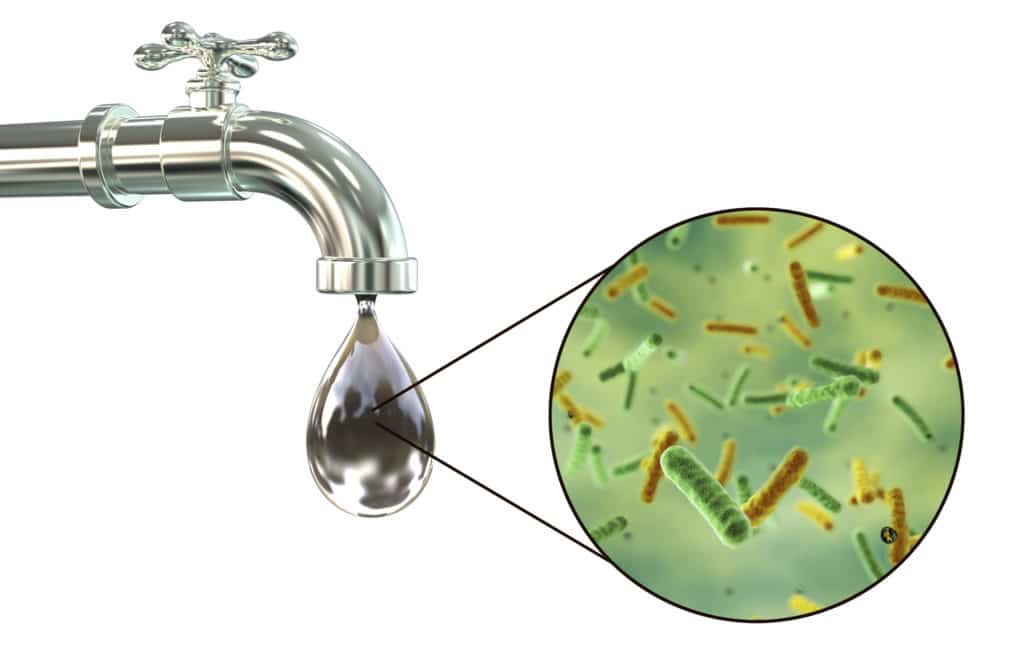Why test for harmful bacteria in your well water? What do fungi have to do with healthy drinking water and pipes? And what is the one mistake many well owners make?
If your home is supplied with well water, your water should be tested for many substances including the most common forms of bacteria and fungi. This is because these organisms can breed in your well and cause health issues if the water is not properly treated.
Well Disinfection Needed
Wells, like anything else, have to be maintained. You have to disinfect the well from time to time. If you don’t, you’ll get microbial buildup. If you get fungi in the well, they may start festering. Then they can cause problems with your pipes, and you don’t want a fungus in your drinking water.
There are no EPA guidelines or limits for what you should or shouldn’t see in your private well water, so it is possible that all kinds of bacteria and fungi and other contaminants could be living in your well. Testing for the presence of certain common kinds of bacteria, such as coliform or E. coli, the most common types that water companies test for, will tell you only that those two forms are present in your water and at what levels.
Health Risks of Bacteria in Drinking Water
If testing reveals the presence of coliform bacteria, specifically E. coli in your drinking water, this does suggest that the water may contain pathogens that can cause problems such as:
- Diarrhea
- Vomiting
- Intestinal cramps
- Nausea
- Headaches
- Fever
- Fatigue
- And even death
Other types of bacteria can cause serious diseases in people such as:
- Cholera
- Diphtheria
- Dysentery
- Bubonic plague
- Pneumonia
- Tuberculosis
- Typhoid fever
- And many more
Infants, children, elderly people and people with weakened immune systems are more likely to get sick or even die from pathogens in drinking water.
If the human body is exposed to bacteria it does not recognize as helpful, the immune system will try to attack them.
The Common Mistake in Water Testing
Many tests merely confirm the presence of two forms of bacteria. They may tell if coliform or E. coli bacteria are present or not. The customer gets back a negative test and thinks his water has a clean bill of health. However, there are thousands of different bacteria so you could still have a high microbial count in the water. And these microbes can lead to digestive difficulties or other illnesses, and can severely tax your immune system.
There are several problems associated with fungi including:
- Blockage or corrosion of water pipes
- Deterioration of taste, color or odor of the water
- Presence of pathogenic fungi
- Mycotoxins (toxic substances produced by fungi) that can, under certain conditions, cause adverse health effects in humans and animals
Having a test at least yearly that checks for all types of bacteria and fungi is a good idea.
What If You Find Bacteria or Fungi in Your Water?
What can you do about the numerous types of bacteria and fungi if you find them in your well water? You can disinfect the well, and should do so with the proper chemicals. Some people think throwing a gallon of beach down the well is a way to disinfect it. Bleach can leave residues plus it is heavier than water so it may stay in parts of your plumbing for a long time.
A better idea is to buy a proper disinfecting kit which uses less toxic chemicals in the right proportion. A kit like this can save your family from all kinds of illness and make your water cleaner for washing dishes and clothes as well.
How Often Should You Disinfect the Well?
At least once a year. You could do it every six months, but experts recommend disinfecting it at least once per year, and more if you notice smells or have other issues in your water.
The best way to know if your well water is harboring bacteria or fungi or other organisms is to test it at least once a year, and more often if you know or suspect you have issues with your water.
ETR Labs has the most modern testing equipment and we test for total microbial count, not just E. coli or coliform bacteria. Order your water quality tests online or call (800) 344-9977.

